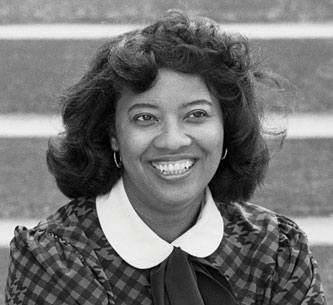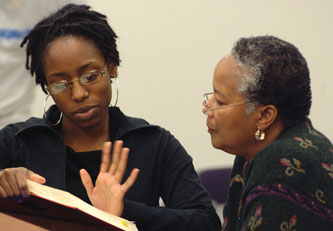Professor Mildred Robinson, a groundbreaking tax law instructor whose scholarship and community service have emphasized equity, will teach her last class at the University of Virginia School of Law at the end of this semester. She will retire this spring after almost 35 years on the faculty.
Robinson was UVA Law’s first African American female tenured professor. She was hired with tenure in 1985 from Florida State University.
At FSU, she received the President’s Award for teaching and served as associate dean for academic affairs. Having earned her J.D. from the Howard University School of Law and her LL.M. from Harvard Law School, she brought her expertise in federal income tax, state and local tax, and trusts and estates here.
Her students have routinely given her courses rave reviews.
“One of my greatest, and perhaps most fortuitous, decisions in law school was to register for Mildred Robinson’s Federal Income Tax,” said Kieran D. Hartley ’14, a California employment lawyer with experience in bankruptcy matters. “The connection I felt was instant and enduring.”
He went on to take her other available classes as well.

“Her approach to tax law is deeply theoretical, yet immensely accessible in practical applications,” Hartley said. “That approach constantly challenged me to understand why we structure tax law in its labyrinthine form in this country, and why this may be good or bad.” (Read another alum’s remembrance in UVA Lawyer’s “Women Who Led the Way.”)
Robinson has been teaching for 47 years. When she began her academic career in Florida, it was rare to be a woman teaching law, much less an African American woman.
“There was only one black woman in the legal academy [at a historically white institution] at that point — Joyce Hughes; she was at Minnesota and is now at Northwestern,” Robinson said. “It was my first job. I went in totally not knowing what to expect, except that I wanted to teach tax. I was very interested in tax by virtue of my exposure at Harvard.”
Robinson’s mentor in tax law was Harvard professor Stanley S. Surrey, who coined the term “tax expenditure” while serving as assistant secretary of the Treasury for tax policy. Surrey was among the first academics to research the fiscal impact on the government of tax breaks and loopholes.
Derrick Bell, another scholarly influence, recommended Robinson for the FSU job. Bell was an attorney, civil rights activist and the first tenured African American law professor at Harvard. Robinson said she fondly remembers how Bell wove in student presentations with his own instruction, allowing her to work through thoughts on such issues as equal access to financing for home ownership.
Robinson found the work environment at FSU, which had only been in operation for a few years when she joined, to be highly supportive. She gained experience there, then served as a visiting professor at UVA Law for a year before accepting Dean Richard Merrill’s offer of a permanent position.
Over her career, Robinson has written about everything from stabilizing public school financing to raising public money for stadiums. A common thread in her research and writings has been social fairness in finance.
“Mildred Robinson’s scholarship views tax law as a central element of social policy rather than a technocratic solution to the government’s budget problem,” her 2004 scholarship profile in Virginia Journal reads.
A 2017 paper published in the Villanova Law Review looked at the problem of funding government through fines. In the piece, Robinson contends that not all fines are bad, but governments such as the one in Ferguson, Missouri, invite disaster by relying heavily on fines to provide municipal services. A climate of aggressive policing in Ferguson culminated with a white police officer fatally shooting a black resident — 18-year-old Michael Brown — and led to riots in 2014. Robinson said financial pressures placed upon the police force undoubtedly contributed to increasingly fraught relations between the police force and the residents of Ferguson.
She has spoken publicly, including at symposia, about her paper.
“Reliance on traffic-fine revenue collected by the police force for general governance expenses represents a significant departure from local governments’ historic reliance on various levies otherwise imposed,” she said in a recent UVA Law Q&A. “As this shift occurs, governance costs are increasingly borne by those residents relatively less able to bear them. All of this became even more troubling in Ferguson, where evidence established a racial animus in ticketing practices. The combination of factors led to the Department of Justice’s conclusion linking revenues practices with patterns of unconstitutional policing.”

While she has mostly written about financial issues, Robinson said her proudest academic moment may be when she “went off script” to work on the book “Law Touched Our Hearts: A Generation Remembers Brown v. Board of Education” (Vanderbilt University Press, 2009), which she co-edited with Professor Richard Bonnie ’69.
The book started as a conversation between the professors about their personal experiences growing up at the end of the school segregation era. Their project soon morphed into a massive mail survey of legal academicians born during the period of 1937-1954. The effort effectively shut down the Law School’s mailroom until the mailing went out, Robinson said.
The resulting essays in the book served as a snapshot of a changing moment in American history. Bonnie said the project was a welcome opportunity to explore the past, and how individual experiences differed, with his friend and colleague.
“One of my most rewarding scholarly experiences was the opportunity to collaborate with Mildred on an unusual project celebrating the 50th anniversary of the Supreme Court’s 1954 decision in Brown v. Board of Education” Bonnie said. “Even today, I am touched by rereading these essays and grateful to Mildred for the opportunity to collaborate with her on this project.
“Mildred’s enduring impact on this Law School will be acknowledged and admired for generations to come, but being her colleague has been a distinct personal blessing for me because she has been a wonderful, thoughtful friend. Based on our very different personal backgrounds and domains of specialization, one might assume we have little in common, but I feel quite the opposite. We have always seemed to see the world the same way — in our understanding of the past and our hopes for the future.”
The daughter of high school educators, Robinson grew up in South Carolina and graduated a year early from Gallman High School in Newberry. (“My dad was my principal, so I always had to mind my p’s and q’s,” she said.) She earned her undergraduate degree from the historically black Fisk University in Nashville, Tennessee, in 1965. While in college, she spent a summer working at the State Department under a program meant to interest rising college seniors in foreign service, but she rejected that possibility in favor of a more settled life in the U.S. She graduated from Howard in 1968, but at a time when firms and law departments weren’t recruiting minorities in large numbers. Instead, she went to work for IBM as a systems engineer, developing software and hardware configurations.
“It was problem-solving, drawing on some of the same kinds of skills you use as a lawyer,” she said of the job, which predated the personal computing revolution. “In order to have 30 gigs of capacity, you had to have a system as big as this office,” she said, referring to her space at the Law School.
Robinson later worked in IBM’s marketing department, before pursuing her advanced law degree. She earned her LL.M. from Harvard in 1971, then worked for a year as director of admissions and assistant dean at Boston University
Throughout her career, she has been active in community service. Volunteering has allowed her, in part, to advocate for fairness on behalf of those who might otherwise be overlooked.
Robinson has served on the board of trustees of the Law School Admission Council, a national organization whose primary function has been to oversee administration of and research pertinent to the LSAT. She was a member of the inaugural board of directors for Law Access, Inc. (currently known as The Access Group), which is focused on educational lending. She was a commissioner from Virginia to the National Conference on Uniform State Laws from 1990-94 and was a member of the board of visitors for the J. Reuben Clark Law School at Brigham Young University from 1993-96. She served as a member of the executive committee of the Association of American Law Schools from 2000-03, and continues to serve as a member of that organization’s Resource Corps. She is a member of the American Law Institute.
At UVA, she has regularly served on committees that facilitate school business. She also created and was in charge of the long-running “Profiles from Practice” series, in which successful lawyers made special visits to the school. A goal of that program was to expose students to role models of diverse backgrounds.
In Charlottesville, she has served as chair of the Piedmont CASA (Court Appointed Special Advocates) board of directors and as chair of the board of trustees of Martha Jefferson Hospital. She previously served on the board of directors of the Center for Nonprofit Excellence.
Robinson was married to noted UVA history professor Armstead L. Robinson, who died in 1995. She called that marriage, her second, “an unexpected gift,” and said she will always remember UVA and the Law School for its many kindnesses, in particular during her time of grief.
She has three adult children who live in Philadelphia. Her oldest daughter, Teressa Ravenell, is a law professor who teaches civil procedure at Villanova University.
Robinson will retire as the Henry L. and Grace Doherty Charitable Foundation Professor of Law. She plans to wrap up her scholarly work in the spring. While she may still write op-eds and the like, retirement will be mostly about family. She will relocate to Philadelphia to spend more time with her children and grandchildren.
She will miss her daily interactions with students the most, she said.
Founded in 1819, the University of Virginia School of Law is the second-oldest continuously operating law school in the nation. Consistently ranked among the top law schools, Virginia is a world-renowned training ground for distinguished lawyers and public servants, instilling in them a commitment to leadership, integrity and community service.


